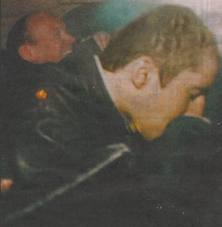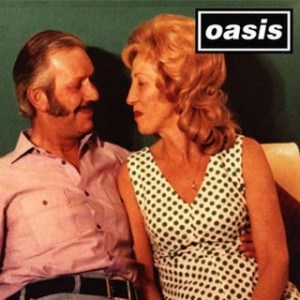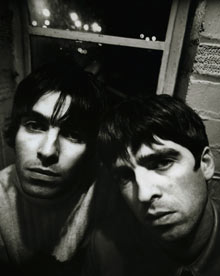READ PART 1 OF THIS ARTICLE: Oasis Retrospective 1991-1995
During 1996, Oasis continued to blow up, selling out a quarter million-attendance concert and climbing the charts with each single. But the band was on the verge of combustion: Liam routinely skipped concerts for the hell of it, leaving Noel with vocal duties. Noel (not for the first or last time) “quit” the band only to rejoin within a month.
With Noel deciding whether to quit the band for good in late 1996 following a humiliating live TV performance, Oasis’s label hurried them back to the studio to make sure the band got at least one more album finished.
One problem: The entire band was doing obscene amounts of cocaine at the time. They attracted attention and trouble, both from nosy media and from shady characters related to the band’s substance use.
So the band moved to a more secluded studio and began recording sessions. Retroactively, these have been labeled disastrous sessions by everyone involved. There are lots of stories of drug use and accusations of being in it just for the money. I attribute at least some of this bile to critics hoping a narrative around the band’s impending implosion.
The truth is that there was at least some creative grand vision. Noel’s desire was to make the album the most “colossal” (his word) album ever. He layered guitar recordings ten tracks deep and wrote songs that sound a lot like collapsing skyscrapers. Alan McGee, the label’s owner, called it the loudest recording and mixing sessions he ever witnessed.
In August 1997, almost two years after the release of Morning Glory, the band’s third album, Be Here Now finally dropped.
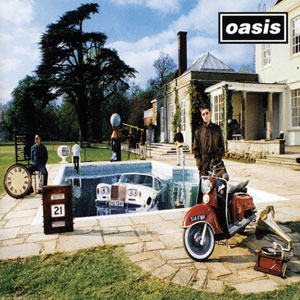 Reviews were — surprisingly — almost entirely positive. The common narrative is that the press was generous in it praise because they were afraid of repeating what happened with Morning Glory: Reviews belittled a somewhat bloated Oasis album, then watched it blow up as a national sensation. (Another possible explanation for the press writing good reviews is that the critics liked the album.)
Reviews were — surprisingly — almost entirely positive. The common narrative is that the press was generous in it praise because they were afraid of repeating what happened with Morning Glory: Reviews belittled a somewhat bloated Oasis album, then watched it blow up as a national sensation. (Another possible explanation for the press writing good reviews is that the critics liked the album.)
Fans — and even some members of the band — had a different take. The public criticized Be Here Now as ugly, impenetrable, self-absorbed rock of the most intolerable order. “Catastophe,” “monstrosity,” and “disaster” are among the monikers often given the album — and not even the meanest ones you’ll read.
Thanks mostly to the huge prerelease hype, the album sold more than 8 million copies, but the album failed to achieve much chart success. There’s an unverifiable legend that Be Here Now is the most returned, pawned, and donated album of all time.
But despite all this… I actually like Be Here Now. A lot. It’s a true, uninhibited marvel of rock and roll exuberance. I have an unpublished, very positive review of Be Here Now saved somewhere on my hard drive, but let me summarize it here:
The album is about twice as long as it should be, but there’s so much disorganized, infectious melody and powerful guitar riffs in these eleven pompous songs that it provides a fascinating, rewarding listen. There are so many hidden gems of moments to uncover, so many absurdities that only the self-proclaimed “biggest band in the world” would have the balls to attempt.
 Case in point: I love it when rock songs use key changes. Key changes are usually my favorite part of whatever songs they’re in. They just give me the chills. Well, the nine-minute “All Around the World,” Oasis’ attempt to create a “Hey Jude”-style masterpiece, has not one but THREE key changes. Are you kidding me? Where else are you going to hear a legendary rock band try something that badass?
Case in point: I love it when rock songs use key changes. Key changes are usually my favorite part of whatever songs they’re in. They just give me the chills. Well, the nine-minute “All Around the World,” Oasis’ attempt to create a “Hey Jude”-style masterpiece, has not one but THREE key changes. Are you kidding me? Where else are you going to hear a legendary rock band try something that badass?
Noel also said in an interview — although I think the story is apocryphal — that he hired two separate string orchestras to perform the string parts of “All Around the World” because one just wouldn’t be enough sound. It’s nutty shit like that which is what I love about Be Here Now.
Some of the songs are stinkers in the whole — I can’t even place the melody for the title track in my head right now — but every track contains a handful of great moments. The hook of “Magic Pie” is totally wacky (“Look at me, I got my magic pie!”) but damn if it doesn’t soar better than any Oasis song this side of “Don’t Look Back in Anger.” “The Girl in the Dirty Shirt” is a ragged pop song that could have been a #1 hit if the band had sanded its edges, but is a better song because they didn’t.
But the best song on Be Here Now — and a top ten song for the band — is “Stand By Me,” a classic, juicy power ballad buoyed by strings and an incredible guitar line. Listen to that and try to tell me with a straight face that all of Be Here Now is shit.
I just like how it’s the sound of a band throwing every damn sound, hook, idea, and stupid lyric they can think of in an attempt to make the biggest, most glorious album conceivable. It’s a marvelous, bewildering sonic experience..
Just like I occasionally emphasize my complaints with the soggy Morning Glory as a counter to its unanimous praise, so I love to point out Be Here Now’s more compelling points in response to its reputation as a disaster. If you want to read a negative spin on Be Here Now, you’re going to have to look elsewhere. I’m in its corner.
(In other words, I reject Noel’s viewpoint — calling it “bland” and “fucking shit” — and accept Liam’s — “If [Noel] didn’t like the record that much, he shouldn’t have put the fucking record out in the first place … I don’t know what’s up with him but it’s a top record, man, and I’m proud of it—it’s just a little bit long.“)
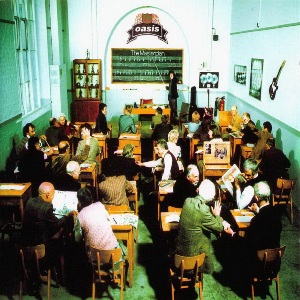 About a year later, the band still touring, Oasis released a collection of B-sides from their early albums called The Masterplan. Though it was a quiet release of songs everyone had already heard, it stands as an easy pick for the band’s third-best LP behind Definitely Maybe and Morning Glory. This is Oasis at their focused, melodic, driving origins that made them famous, with more than half of the album five-star material.
About a year later, the band still touring, Oasis released a collection of B-sides from their early albums called The Masterplan. Though it was a quiet release of songs everyone had already heard, it stands as an easy pick for the band’s third-best LP behind Definitely Maybe and Morning Glory. This is Oasis at their focused, melodic, driving origins that made them famous, with more than half of the album five-star material.
After the supporting tour for Be Here Now concluded in ’98, Oasis began to fall apart at the seams. Two of the founding members quit, and their record label folded. Noel put a no-substances rule in place for future recording sessions, to which the band reluctantly agreed.
Noel dominated the recording sessions for the band’s fourth album, playing multiple instruments and recording more vocals than ever. He focused the band’s sounds a little bit more this time, giving songs more distinct flavors than the nonstop “kaboom” of Be Here Now.
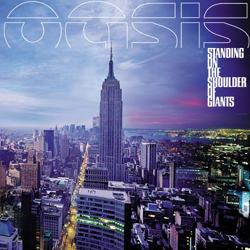 But the result is that it sounds more like a lion’s fart than a lion’s roar. I pretty much never listen to Standing on the Shoulder of Giants (2000), and I find only a couple of its songs worth revisiting. Noel’s curiosity with electronica doesn’t suit the band particularly well, and the hooks don’t do much more for me.
But the result is that it sounds more like a lion’s fart than a lion’s roar. I pretty much never listen to Standing on the Shoulder of Giants (2000), and I find only a couple of its songs worth revisiting. Noel’s curiosity with electronica doesn’t suit the band particularly well, and the hooks don’t do much more for me.
The band’s live album, Familiar to Millions, from the next year is worth listening to once, but sloppy and far from definitive. Liam’s voice lacks the edge of the studio versions, though Noel’s guitar flourishes provide some nice moments.
The band’s fifth album, Heathen Chemistry, was released in 2002, and it earned a reputation as the band’s worst album this side of Be Here Now. I actually think it’s a step up from Shoulders; the songs still fizzle more often than they shine, but the crisp production behooves the band much better. You can tell the band listened to ‘68 Beatles on loop in preparation for recording this album.
A turning point for the band’s reputation was around the corner, though. After some more band turnover — including the recruitment of Ringo Starr’s son to play drums — and a few more tabloid-worthy incidents, Oasis hit the studios for their sixth album.
Since the late ’90s, Noel had gradually grown more willing to share songwriting responsibilities. Shoulder had Liam’s first-ever writing credit in the awful “Little James,” while Chemistry featured writing credits for the entire band
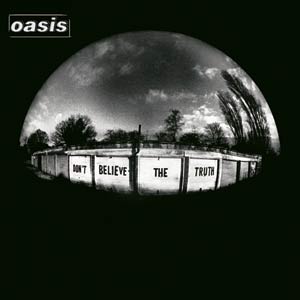 But it wasn’t until their sixth studio album, Don’t Believe the Truth, that the multiple voices felt like they were a benefit to the band. There’s a sense of collaboration here, of ideas that have been iterated and improved upon until something strong remains.
But it wasn’t until their sixth studio album, Don’t Believe the Truth, that the multiple voices felt like they were a benefit to the band. There’s a sense of collaboration here, of ideas that have been iterated and improved upon until something strong remains.
It’s a good album, listenable and enjoyable, even if it’s only a foothill to the majestic peaks of Definitely Maybe and Morning Glory. The album’s best tracks — “Lyla” and especially “The Importance of Being Idle” — sound like modest, muscular hits, informed by the band’s past but not bound to it; grown up, but not quite grizzled.
Weaker tracks, including most of the second half of the album, sound either forgettable or (in the case of “Let There Be Love”) promising but undercooked.
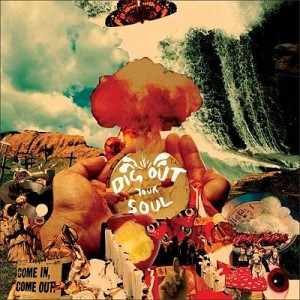 Three years and a Greatest Hits compilation later, Oasis released their seventh album, Dig Out Your Soul. The 2008 album is another step up from Don’t Believe the Truth. It sounds like Oasis rediscovering their mojo. The first half of the album is Oasis’s strongest stretch since at least Be Here Now.
Three years and a Greatest Hits compilation later, Oasis released their seventh album, Dig Out Your Soul. The 2008 album is another step up from Don’t Believe the Truth. It sounds like Oasis rediscovering their mojo. The first half of the album is Oasis’s strongest stretch since at least Be Here Now.
“Waiting for the Rapture” and “Bag It Up” are genuine delights that remind you how Oasis could hit a hell of a groove in their heyday. “Shock of the Lightning” was a respectable hit, and its ragged, dense sound makes it another highlight.
The second half of the album lags behind the first, but let’s be honest: You can say that about any Oasis album except Definitely Maybe. At least Dig Out Your Soul is rounded off with some decent album tracks: the psychedelic and awfully-titled songs “To Be Where There’s Life” and “The Nature of Reality” are actually pretty good listens.
Alas, Oasis’s second wind was not destined to last. Rumors persisted that Noel was hungry to try a solo career. Before a concert in November 2009, Liam and Noel’s bickering escalated beyond their usual squabbles. Liam smashed Noel’s guitar, and Noel stormed out.
The concert was canceled, and hours later Noel announced that he had quit the band. Oasis was over. (Noel started a new, mostly-solo act called High Flying Birds, while Liam and the rest of Oasis changed their band’s name to Beady Eyes.)
It’s appropriate that Oasis died by the very sword it lived by for so many years: the tension between the brothers Gallagher and the creativity that inspired (or, in later years, failed to inspire).
Noel and Liam were yin and yang, ego and id, thunder and lightning. They’re hilarious and quotable, definitely my favorite “rock stars” of the past quarter century. I also like to believe that, deep down, they love each other and realize that they had something special in their collaboration.
To quote “Acquiesce” — one of the band’s best songs, and one of the few where Liam and Noel shared vocal duties:
We need each other / we believe in one another / and I know we’re going to uncover / what’s sleeping in our soul



